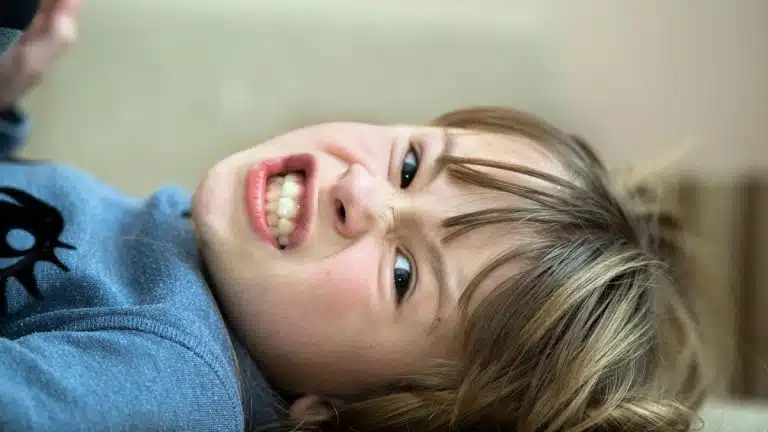Child Laughs When Hurting Others: Unveiling the Reasons


It’s common to see a child hit something, like a toy or even another child and then burst out laughing. This behavior can be puzzling for parents and caregivers, who may wonder why a child would find hitting funny.
This article will explore why some toddlers laugh when they hurt others.
Please read our comprehensive guide if you want to learn about “the reasons why children hurts others & what to do.”
When children laugh while facing trouble, it’s a complex response that can often puzzle parents. This behavior doesn’t necessarily signify amusement; rather, it often stems from a mixture of emotions and psychological mechanisms.
Children might laugh due to a release of nervous energy, a way to cope with intense feelings, or even as a means of seeking attention. The act of laughter in these situations is not about finding the situation humorous, but rather a unique expression of their emotional and psychological responses.
Understanding this intricate behavior helps parents respond with empathy and provide the necessary support during such moments.
Hitting can sometimes trigger physical or emotional responses in a child.
The child might be seeking attention when resorting to hitting.
Hitting and laughing could be associated with the behavior of other children around them.
Children might resort to hitting and laughing as a way to deal with challenging or difficult situations.
While less common, in some cases, hitting and laughing might be linked to sensory processing disorder.
Let’s dive more into these reasons:
Hitting can trigger a physical response in children, which may cause them to laugh. When a child hits something, it can create tension and release in the body, similar to the feeling of a rollercoaster ride. This physical response can lead to laughter, even if the child doesn’t understand why they are laughing.
Hitting can also trigger an emotional response in children, which may cause them to laugh. When a child hits something, they may feel a sense of power and control, which can be exciting and pleasurable. This feeling of power and control can lead to laughter as the child feels a sense of satisfaction and accomplishment.
Hitting can also be a social response for children, especially in group settings. When a child hits something and other children are present, they may laugh in response to the reaction of their peers. This social response can reinforce the behavior, as the child associates hitting with positive social interactions and attention.
Explore further insights into positive reinforcement in our related blog post: ‘How Positive Reinforcement Shapes Children’s Behavior’.
For some children, laughing after hitting may be a coping mechanism for dealing with difficult emotions. Hitting can be a way for children to release pent-up frustration or anger, and laughing can be a way to cope with those emotions. Laughing may also be a way for children to diffuse tense situations and ease their discomfort.
In some cases, laughing after hitting may be a symptom of a sensory processing disorder. Children with sensory processing disorders may have difficulty processing sensory information, which can cause them to become overwhelmed and act out. Laughing may be a way for these children to cope with the sensory overload caused by hitting.
Finally, laughing after hitting may be a form of attention-seeking behavior for some children. If a child is not receiving enough attention or positive reinforcement from their caregivers, they may resort to hitting to get attention. Laughing may be a way to draw attention to their behavior further and get the attention they crave.
For deeper insights into the attention-seeking behavior, explore our related article: “Attention And Connection: Fulfilling Children’s Emotional Needs”.
In conclusion, there are many reasons why some children laugh after they hit or when they are in trouble. Whether it’s a physical, emotional, social, or coping response, laughing can be a way for children to deal with difficult situations and emotions. Understanding why a child laughs after hitting can help caregivers respond appropriately and provide support as needed.
Besides children who laugh after they hurt others, it is also possible to smile or laugh when they get hurt. Here you can find our article about children laughing after getting hurt.
Yes, hitting and laughing can be a normal behavior for children, especially when they are learning about cause and effect.
Not necessarily. Laughing after hitting can be a normal behavior, but it’s important to monitor the behavior and intervene if necessary.
Setting clear boundaries, modeling appropriate behavior, and providing positive reinforcement for good behavior can help toddlers stop hitting.
If your child’s hitting behavior is persistent, aggressive, or causing harm to themselves or others, it may be time to seek professional help from a therapist or other mental health professional.
In some cases, hitting can be a sign of deeper emotional or behavioral issues, such as anxiety, Autism spectrum disorder (ASD), oppositional defiant disorder or Deficit And Hyperactivity Disorder ADHD. It’s important to consider the context of the hitting behavior and seek professional help if needed.
It’s important to respond to your child’s hitting and laughing behavior in a calm and firm manner. Set clear boundaries and consequences for hitting, and provide positive reinforcement for appropriate behavior.
Normal hitting behavior is typically sporadic and not aggressive, while problematic hitting behavior is persistent and aggressive. It’s important to seek professional help if the hitting behavior is causing harm to the child or others.

Behavioral Psychologist Nefise Shaban